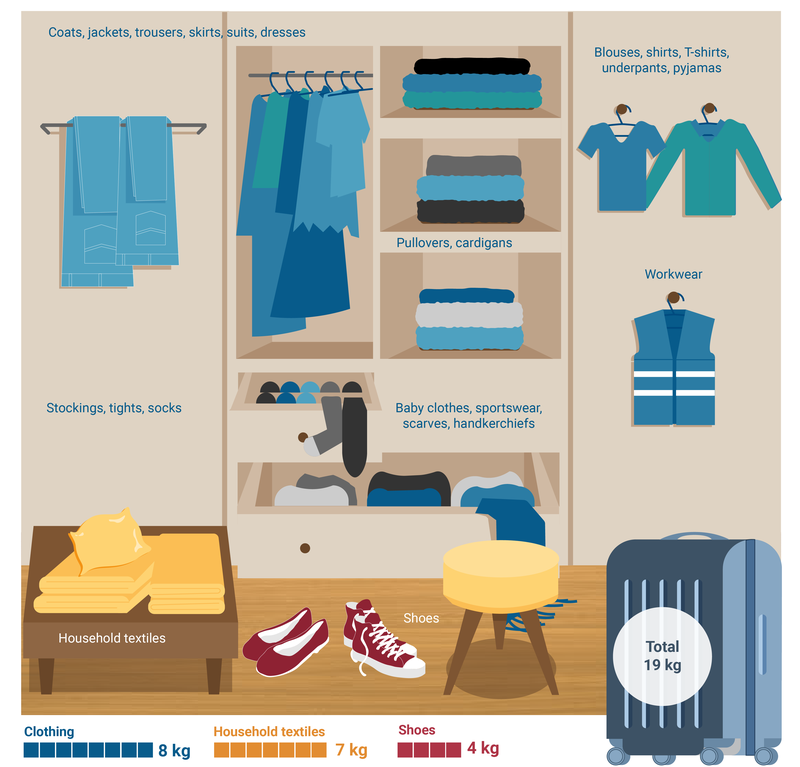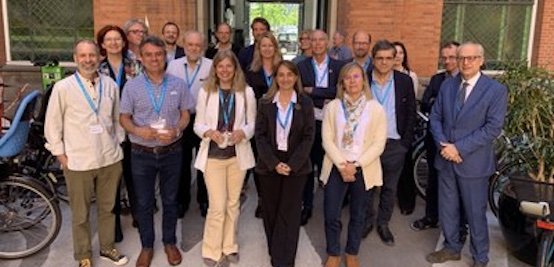#Europe
Consumption of clothing, footwear, other textiles in the EU reaches new record high
The average EU citizen bought 19 kilograms (kg) of clothing, footwear and household textiles in 2022 — up from 17 kg in 2019, which is enough to fill a large suitcase per person each year according to the EEA briefing 'Circularity of the EU textiles value chain in numbers'. The assessment analyses the latest data available on the circularity of the EU’s textile value chain.
The impact of our current production and consumption of textiles system continues to cause high pressures on our environment and climate, including through material use, water and land use, greenhouse gas emissions, chemical and microplastics.
Circularity of the EU textiles value chain in numbers
Circularity of the EU textiles value chain in numbers
Out of the 19kg, 8kg consisted of clothing; 7kg was household textiles and 4kg was footwear.
Out of the 19kg, 8kg consisted of clothing, 7kg was household textiles and 4kg was footwear.
The EU’s textiles strategy is aimed at reducing these impacts and making textiles more circular and sustainable by design. For its success, a systemic shift in the textiles system is needed, moving to the production of more circular goods and higher quality goods that have longer use value, and can be more easily reused, repaired or recycled. The EEA’s Circularity Metrics Lab’s new module on textiles is monitoring this progress.

Fast fashion and online shopping
The combination of increased online shopping, social media influencers and cheap production costs for synthetic textiles has been instrumental in the growth of fast fashion. This has allowed retailers to offer consumers new styles at low prices. The EEA briefing notes that digital technologies like 3D printing can reduce waste in production and can be used to reduce the environmental and climate pressures from textiles by improving efficiency. However, they also risk increasing consumption by enabling cheaper production costs and lower prices.
Impact on the environment and climateThe environmental and climate pressures from EU textiles production and consumption remain high. Out of 12 categories of European household consumption — such as food, mobility, housing, health and education — textile consumption ranked, on average, the fifth largest in terms of environmental and climate pressures. The EEA measured these impacts across the metrics of raw material use, greenhouse gas (GHG) emissions and water and land use.
Textile production and consumption also contribute to other environmental pressures, including air pollution, chemical use and pollution, microplastics pollution from production, the use and washing of textiles, as well as pressures from the handling of textiles that end up as waste.
Textile waste and exports
In 2022, EU Member States generated about 6.94 million tonnes of textile waste, which amounts to 16kg per person. The total amount of textile waste generation has remained relatively stable since 2016.
The average collection of textile waste in the EU — an indicator of the effectiveness of separate collection systems — has been slowly increasing, rising by 4.3 percentage points since 2016 but overall, the collection of this waste has been low. In 2022, 85% of all textile waste from households was not collected separately and instead ended up as mixed household waste which ended up in landfills or incineration, from which it can’t be reused or recycled.
The implementation of EU legislation on separate textile waste collection, starting in 2025, is expected to significantly increase the capture rates for textiles from households.
The amount and share of textile waste sent to landfill in Europe has decreased, from 21% in 2010 to 12% in 2022. The amount sent for incineration (with and without energy recovery) in Europe has increased from 10% in 2010 to 14% in 2022.
Since 2000, the export of used textiles has nearly tripled, from a little over 550,000 tonnes in 2000, to 1.4 million tonnes in 2019. Since then, the volume has remained relatively constant, with 1.4 million tonnes having been exported in 2023.
While exports of used textiles from the EU are intended for reuse or recycling, studies show that EU textile exports enter a very complex pattern of trade, sorting, reuse, recycling and landfilling, and some is being burned or dumped in nature across mainly African and Asian countries.
The EEA briefing will be presented at the following events:
26 March - Policy Breakfast: Re-Shaping Fashion Industry at the European Parliament
27 March: Threading up Europe’s textile circularity
1 April: Webinar - Presenting New Metrics and Data for Circularity & Sustainability in Textiles













